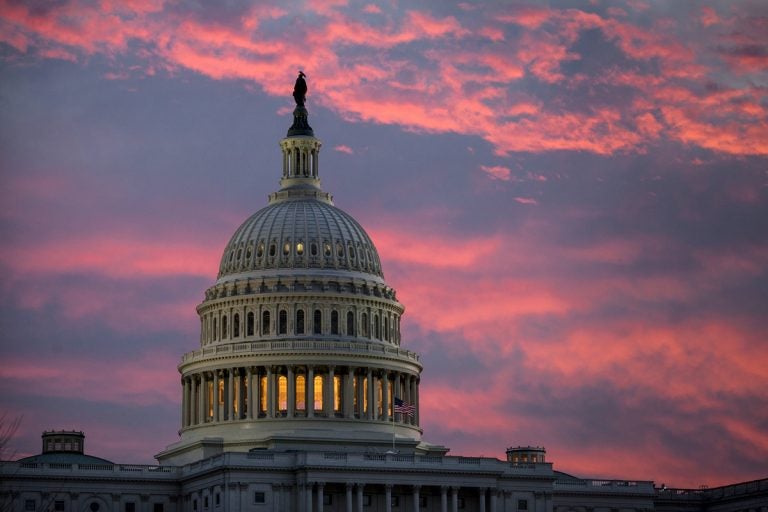Pa. health providers urge Congress to extend Medicare telehealth options set to expire in 2025
Policies expanding access to telehealth for Medicare participants will end Dec. 31 unless Congress extends them this week.
Listen 1:12
The U.S. Capitol is seen at dawn in Washington, D.C., Nov. 30, 2017. (AP Photo/J. Scott Applewhite, file)
From Philly and the Pa. suburbs to South Jersey and Delaware, what would you like WHYY News to cover? Let us know!
For the last couple years, Dr. Amy Davis has treated her patients in southeastern Pennsylvania both in person and remotely through telehealth, which can involve video conferencing or audio-only calls.
During one of these telehealth video chats with a patient who was receiving palliative care for a serious illness, Davis saw some items on a counter in the background that indicated this person may also be struggling with an addiction or substance use problem.
“I could then gently bring that into the conversation,” Davis said. “That person was able to get very intensive care that they genuinely needed. I would not have known that it was even an issue probably for months, except for the fact we were on a telehealth call and I could see what was going on in the room.”
Another time, Davis had a patient who would only take their appointments over the phone in their car. The doctor, out of curiosity, asked if there were any privacy concerns and learned that the patient was being physically abused and the car was a safe place to take these health calls.
These are the kinds of patients that Davis, who chairs the health and public policy committee for American College of Physicians Pennsylvania Chapter, is worried about if access to telehealth is reduced or stopped altogether.
Health care providers and patients are trying to prepare for that possibility. Policies made during the COVID-19 pandemic to expand Medicare access to telehealth are set to expire at the end of the year unless Congress extends them into 2025.
“There’s no stuffing the genie back in the bottle, so to speak,” Davis said. “The world is different, and so if the policy does expire, we’re not in the same place as we were before the pandemic.”
Before the pandemic, Medicare coverage for telehealth was mostly restricted to rural areas or places with worker shortages, for certain patients and specific health providers. Covered services were also limited to preventative health screenings and mental health therapy.
Davis said there was already interest in expanding telehealth when the government declared a COVID-19 public health emergency in 2020 and relaxed telehealth rules and restrictions.
Since then, Medicare telehealth coverage has extended to additional health services like physical therapy, eye exams and medical nutrition counseling. It can be used by people living in rural and urban areas and can be done wherever a patient is — at home, in their car, at work or elsewhere.
Davis said more patients today rely on virtual visits and technology to access health care. This is especially true for people who lack transportation or paid time off from work, have mobility issues or have other responsibilities that may prevent them from making it to a doctor’s office.
Nationally, about 7% of Medicare enrollees used a telehealth service at the beginning of 2020 compared to about 12% of enrollees in the second quarter of 2024, according to data from the Centers for Medicare and Medicare Services.
“[Telehealth] is not perfect, it is not the panacea. There are times you need to be in person to have good medical care,” Davis said. “But it’s a supplement and it’s another way of approaching medical care that really opened up better health care for so many more people.”
Telehealth in legislation limbo
If Congress does not extend some Medicare telehealth flexibilities, as it has done in the past, they will expire after Dec. 31. An extension will likely be included in a larger package of health-related bills as lawmakers debate how to fund the government beyond this week.
Negotiations among leaders in the U.S. House of Representatives and the U.S. Senate are ongoing as the two chambers work to pass the last pieces of legislation this year before breaking for the winter holidays.
In the meantime, Davis is scheduling telehealth appointments with patients in 2025 as if the flexibilities will continue into the new year, “but I have also warned them that it might not be in place. They are not happy about that.”
These last-minute decisions and actions put a strain on health care practices and health systems as they try to prepare for what appointments and options may look like in the new year, Davis said.
“You do have to have things like workflows and if all of that is changing, we have to be prepared for that,” she said. “And yet, taking that time to be prepared is going to take away from actually caring for patients.”

Get daily updates from WHYY News!
WHYY is your source for fact-based, in-depth journalism and information. As a nonprofit organization, we rely on financial support from readers like you. Please give today.





